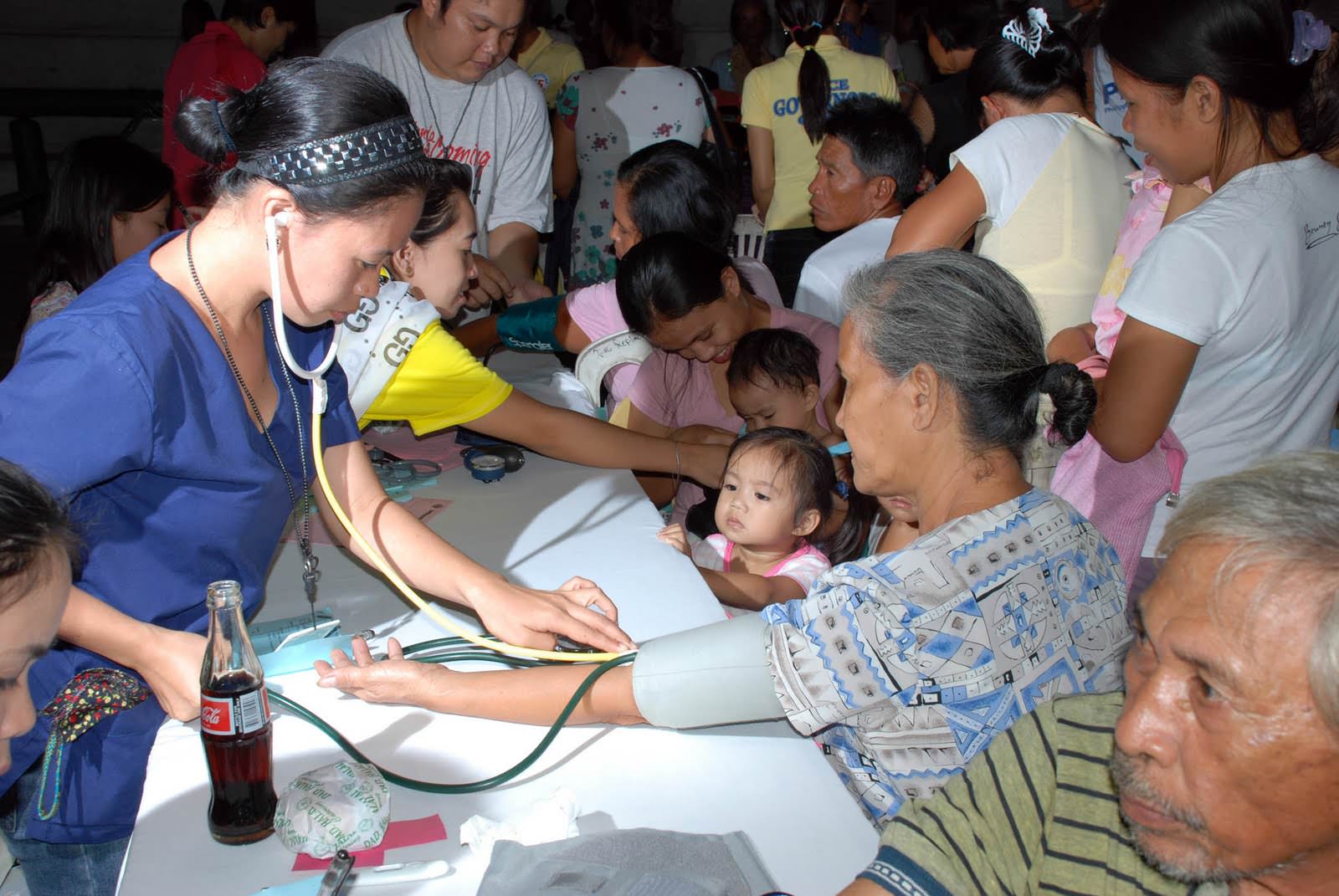

Featured
What Is Community Health Nursing
Modified: January 2, 2024
Learn all about community health nursing and its importance in promoting well-being within local populations. Discover the key role of community health nurses in providing care and support. Featured article!
Introduction
Welcome to the fascinating field of community health nursing! This article will provide you with an in-depth understanding of what community health nursing is all about. As a specialized area of nursing practice, community health nursing focuses on promoting and preserving the health and well-being of individuals, families, and communities.
Community health nursing is rooted in the principles of public health and aims to address the health needs of a specific population or community. It emphasizes the importance of preventative care and health promotion, as well as providing healthcare services to individuals and families within their own community settings.
Unlike other nursing specialties that primarily focus on individual patient care, community health nursing takes a holistic approach by considering the social, economic, and environmental factors that influence the health of a community. By addressing these determinants of health, community health nurses strive to create healthier communities and improve overall population health.
Community health nurses work in a variety of settings, including clinics, schools, community centers, and public health departments. They collaborate with interdisciplinary teams and community partners to develop and implement strategies that address the unique healthcare needs of their target population.
Throughout this article, we will explore the roles and responsibilities of community health nurses, the core values and principles that guide their practice, the education and training required to become a community health nurse, and the challenges and future directions of this vital nursing specialty. So, let’s delve into the exciting world of community health nursing and discover how these dedicated professionals make a difference in the lives of individuals and communities.
Definition of Community Health Nursing
Community health nursing, also known as public health nursing, is a specialized field of nursing that focuses on the health and well-being of individuals, families, and communities. It involves providing healthcare services, promoting health education, and advocating for the needs of a specific population or community.
Community health nurses work in collaboration with individuals, families, community organizations, and other healthcare professionals to identify and address health issues and improve overall community health outcomes. Their role goes beyond providing direct patient care; they play a crucial role in preventing illness, promoting wellness, and addressing the social determinants of health.
The core concept of community health nursing is the belief that health is not just an individual matter, but is influenced by the broader social, economic, and environmental factors within a community. Community health nurses take a population-based approach, focusing on the health needs of a specific group or community, rather than individual patients.
These nurses play a vital role in assessing the health needs of a community, developing and implementing health promotion programs, and evaluating the effectiveness of interventions. They collaborate with community members, community leaders, and stakeholders to address health disparities, create strategies for disease prevention, and develop policies that promote the overall well-being of the community.
By working in partnership with the community, community health nurses strive to empower individuals and communities to take control of their health and make informed decisions. They provide culturally sensitive care, taking into account the unique values, beliefs, and practices of the community they serve.
One of the key aspects of community health nursing is a focus on health promotion and disease prevention. Community health nurses engage in activities such as health education and awareness campaigns, immunization initiatives, and screenings to identify health risks and provide early interventions.
Overall, community health nursing is a dynamic field that recognizes the interconnectedness of individual health with the well-being of the community as a whole. Through their multifaceted roles and responsibilities, community health nurses strive to create healthier communities and improve the overall quality of life for individuals and families.
Roles and Responsibilities
Community health nurses have diverse roles and responsibilities that encompass different aspects of healthcare delivery and health promotion within a specific community or population. Their primary focus is to improve the overall health and well-being of individuals, families, and communities. Let’s explore some of the key roles and responsibilities of community health nurses:
- Assessment: Community health nurses assess the health needs and risks of the population they serve. This involves conducting comprehensive health assessments, collecting data, and identifying health trends and patterns within the community.
- Health Education and Promotion: Community health nurses play a critical role in educating individuals and communities about health-related issues. They develop and implement health promotion programs, provide resources and information on disease prevention, and empower individuals to make informed decisions about their health.
- Advocacy: Community health nurses advocate for the health needs of the community they serve. They work closely with community organizations, policymakers, and other healthcare professionals to address healthcare disparities and promote equitable access to healthcare services.
- Collaboration: Community health nurses collaborate with interdisciplinary teams, community leaders, and stakeholders to develop and implement community health initiatives. They work together to address health challenges, develop strategies for disease prevention, and create partnerships that promote the overall well-being of the community.
- Case Management: Community health nurses provide case management services to individuals and families who require ongoing healthcare support. This involves coordinating services, advocating for needed resources, and ensuring continuity of care.
- Screenings and Immunizations: Community health nurses conduct screenings and immunizations to identify and prevent health conditions. They administer vaccines, perform health screenings, and provide education on early detection and prevention strategies.
- Disaster Preparedness: Community health nurses play a crucial role in disaster preparedness and response. They develop plans, educate the community on emergency preparedness, and provide healthcare services during times of crisis.
- Evaluation and Monitoring: Community health nurses evaluate the effectiveness of healthcare interventions and programs. They collect data, monitor outcomes, and make evidence-based decisions to improve the quality and impact of their services.
These are just a few examples of the roles and responsibilities of community health nurses. Their scope of practice may vary depending on the specific community and setting they work in. However, their overarching goal is to promote health, prevent illness, and create positive health outcomes for the individuals and communities they serve.
Core Values and Principles
Community health nursing is guided by a set of core values and principles that shape the practice and ensure the provision of high-quality care. These values and principles reflect the ethical, professional, and holistic approach that community health nurses adopt in their work. Let’s explore some of the core values and principles of community health nursing:
- Empowerment: Community health nurses believe in the power of empowering individuals and communities to take control of their health. They work collaboratively with community members, providing them with knowledge, skills, and resources to make informed decisions about their health and well-being.
- Cultural Competence: Community health nurses recognize and respect the diversity of individuals and communities they serve. They strive to provide culturally sensitive care, understanding the unique values, beliefs, and practices that shape the health behaviors of different cultural groups.
- Advocacy: Community health nurses advocate for the health needs and rights of the community. They collaborate with community organizations, policymakers, and other healthcare professionals to address health disparities and promote access to equitable healthcare services.
- Prevention: Community health nursing emphasizes the importance of preventative care and disease prevention. Nurses focus on health promotion, early detection, and intervention to prevent the development of health problems and improve health outcomes.
- Community Partnership: Community health nurses understand the power of community collaboration. They actively engage with community members, community organizations, and stakeholders to develop and implement health programs and initiatives that meet the specific needs of the community.
- Ethics and Professionalism: Community health nurses adhere to ethical principles and professional standards in their practice. They maintain confidentiality, respect autonomy, and ensure the highest level of professional integrity when providing care to individuals and communities.
- Evidence-Based Practice: Community health nurses base their interventions and decisions on the best available evidence. They continuously update their knowledge and skills to ensure that their practice is informed by the latest research and evidence in the field.
- Health Promotion: Community health nurses prioritize health promotion and education as a fundamental aspect of their practice. They provide individuals and communities with the necessary tools and resources to improve their health and make informed decisions about their well-being.
These core values and principles guide community health nurses in delivering holistic and patient-centered care. They serve as a foundation for building trust and rapport with individuals and communities, fostering collaborative relationships, and ultimately improving the health outcomes of the population they serve.
Education and Training
Becoming a community health nurse requires a comprehensive education and training that equips nurses with the knowledge and skills necessary to excel in this specialized field. While the specific educational requirements may vary depending on the country and institution, there are generally recognized pathways to becoming a community health nurse. Here is an overview of the education and training involved:
Undergraduate Education: The first step in becoming a community health nurse is to complete a bachelor’s degree in nursing (BSN). This four-year program provides a solid foundation in nursing knowledge and skills, including coursework in anatomy, physiology, pharmacology, ethics, and clinical practice. The BSN program also includes community health nursing courses to introduce students to the concepts and principles of the field.
Experience: After completing the BSN program, aspiring community health nurses often gain clinical experience in various healthcare settings. This hands-on experience provides opportunities to apply theoretical knowledge, develop critical thinking skills, and gain exposure to different populations and community health issues.
Specialization: Some nurses may choose to pursue a specialization in community health nursing during their master’s or doctoral programs. These programs provide advanced education in community health nursing and offer opportunities for specialization in areas such as public health, population health, or community health leadership.
Certification: In many countries, community health nurses have the option to obtain certification in community health nursing. Certification demonstrates expertise in the field and may require successful completion of an examination and fulfillment of certain criteria, such as a specified number of years of experience in community health nursing.
Continuing Education: Community health nursing is a dynamic and evolving field, and ongoing education is essential to stay current with best practices and developments. Community health nurses are encouraged to pursue continuing education opportunities, attend conferences, participate in professional organizations, and engage in lifelong learning to enhance their knowledge and skills.
Interdisciplinary Collaboration: Community health nurses also benefit from interdisciplinary collaboration. They work in close partnership with other healthcare professionals, such as social workers, public health officials, and community leaders, to address complex health challenges and develop comprehensive solutions. Collaboration helps to provide holistic care, optimize resources, and promote community engagement and empowerment.
Professional Development: Professional development is an ongoing process for community health nurses. It involves staying updated on the latest research and evidence, attending workshops, engaging in networking opportunities, and seeking leadership roles within the field. Professional development helps nurses grow in their practice, contribute to the advancement of community health nursing, and create positive change within the communities they serve.
By acquiring a solid educational foundation, gaining practical experience, pursuing specialization, obtaining certification, engaging in continuing education, collaborating with interdisciplinary teams, and embracing professional development opportunities, community health nurses are equipped to make a significant impact on the health and well-being of individuals, families, and communities.
Assessing Community Health Needs
Assessing community health needs is a crucial aspect of community health nursing. This process involves gathering data and information to understand the specific health challenges, resources, and strengths of a community. It serves as the foundation for effective planning and implementation of healthcare interventions. Let’s explore the key steps and considerations involved in assessing community health needs:
Data Collection: Community health nurses collect data from various sources to gain a comprehensive understanding of the health needs of the community. This includes demographic data, health records, epidemiological data, community surveys, and qualitative information obtained through interviews or focus groups. By analyzing this data, nurses can identify health disparities, trends, and patterns within the community.
Community Engagement: Community health assessments are most effective when conducted in collaboration with community members. By actively engaging with the community, nurses can understand the unique perspectives, values, and needs of the population they serve. This engagement can include attending community meetings, forming partnerships with community organizations, and involving community members in the assessment process.
Identifying Health Issues: Once data is collected, community health nurses analyze the information to identify priority health issues. By considering factors such as prevalence, severity, and impact on the community, nurses can determine which health problems require attention and intervention. Common health issues may include chronic disease, substance abuse, mental health, access to healthcare, and environmental health concerns.
Resource Mapping: Assessing community health needs also involves identifying available resources and assets within the community. This includes healthcare facilities, community organizations, educational programs, and support services. By understanding community resources, nurses can leverage them to develop sustainable interventions and maximize community engagement and participation.
Health Disparities and Social Determinants of Health: Community health assessments should also address health disparities and social determinants of health. These factors include socioeconomic status, education, access to healthy food, safe housing, and social support networks. By identifying these determinants, nurses can work towards addressing root causes and promoting health equity within the community.
Collaboration: Assessing community health needs is a collaborative process that involves working with interdisciplinary teams, community partners, and stakeholders. By collaborating, nurses can gather diverse perspectives, pool resources, and develop a comprehensive understanding of community health needs. This collaboration also fosters community ownership and ensures that interventions are responsive to the unique needs and values of the community.
Continuous Assessment: Community health needs are not static and can change over time. Community health nurses should engage in continuous assessment, monitoring, and evaluation of community health needs to track progress, identify emerging issues, and adapt interventions accordingly. This ongoing assessment helps to ensure the relevancy and effectiveness of healthcare programs in meeting the evolving needs of the community.
By conducting comprehensive community health assessments and involving community members in the process, community health nurses gain valuable insights that inform effective planning and implementation of interventions. This person-centered approach enables nurses to address the specific health needs, promote health equity, and improve the overall health and well-being of the communities they serve.
Planning and Implementing Interventions
Planning and implementing interventions is a critical phase in community health nursing. Once the community health needs have been assessed, nurses collaborate with community members, stakeholders, and interdisciplinary teams to develop and execute effective interventions that address the identified health issues. Let’s explore the key steps involved in planning and implementing interventions:
Setting Goals and Objectives: Nurses work with the community and stakeholders to establish clear goals and objectives for the interventions. These goals should be specific, measurable, achievable, relevant, and time-bound (SMART). By setting clear objectives, nurses can track progress and evaluate the impact of their interventions.
Evidence-Based Practice: Community health nurses base their interventions on evidence-based practice, which involves integrating the best available research evidence with their clinical expertise and the unique needs of the community. By using evidence-based interventions, nurses can ensure that their actions are informed by proven strategies that have achieved positive health outcomes in similar populations.
Partnerships and Collaboration: Successful interventions rely on strong partnerships and collaboration with community organizations, healthcare providers, and other stakeholders. Nurses work with these partners to leverage resources, share expertise, and coordinate efforts to maximize the impact of interventions. Collaboration also helps to build community trust and improves the sustainability of interventions.
Tailoring Interventions to the Community: Community health interventions should be tailored to the specific needs, values, and cultural context of the community. Nurses consider the social determinants of health, cultural beliefs, and community resources when designing and implementing interventions. This culturally sensitive approach ensures that interventions are relevant, accessible, and acceptable to the community.
Education and Health Promotion: Community health nurses play a vital role in educating individuals and communities about health-related topics. They provide health education, raise awareness about prevention strategies, and facilitate behavior change. This education can take various forms, such as workshops, community presentations, one-on-one counseling, or the distribution of informational materials.
Advocacy and Policy Development: Nurses advocate for policy changes and contribute to the development of policies that support community health. They collaborate with policymakers, community leaders, and community members to address social determinants of health and advocate for the needs of the community. Through advocacy, nurses strive to create sustainable changes that promote equitable access to healthcare and improve overall population health.
Monitoring and Evaluation: Community health nurses continuously monitor and evaluate the outcomes and impact of interventions. This involves collecting and analyzing data, assessing program effectiveness, and making necessary adjustments. Regular evaluation ensures that interventions are reaching their intended goals and allows nurses to make evidence-based decisions for continuous improvement.
Community Engagement and Empowerment: Nurses actively engage with community members throughout the planning and implementation process. Community participation and empowerment are crucial for the success of interventions. By involving community members, nurses ensure that the interventions align with community values, preferences, and priorities. This engagement fosters community ownership and increases the sustainability and long-term impact of the interventions.
By following these steps and utilizing a collaborative, evidence-based approach, community health nurses can effectively plan and implement interventions that address the identified health issues in the community. Through their dedication, expertise, and strong community partnerships, nurses contribute to improving the health and well-being of individuals, families, and communities.
Evaluating and Monitoring Outcomes
Evaluating and monitoring outcomes is a crucial component of community health nursing. It involves systematically assessing the impact and effectiveness of interventions implemented within the community. By evaluating outcomes, nurses can determine the success of their interventions, identify areas for improvement, and make evidence-based decisions for future planning. Let’s explore the key steps involved in evaluating and monitoring outcomes in community health nursing:
Data Collection: The evaluation process begins with the collection of relevant data. Nurses gather information about the implementation of interventions, the outcomes achieved, and any changes observed in the community. Data can be collected through surveys, interviews, observations, and analysis of existing records and reports.
Outcome Measurement: Nurses measure the outcomes of their interventions to determine their impact on the community. This involves comparing the data collected before and after the implementation of interventions. Outcome measurement can include changes in health behaviors, healthcare utilization, health status indicators, and community satisfaction.
Analysis and Interpretation: The data collected is analyzed and interpreted to understand the effectiveness of interventions. Nurses use statistical methods and qualitative analysis to identify trends, patterns, and relationships within the data. The goal is to assess the extent to which the interventions have achieved their intended outcomes and to identify any unexpected or unintended effects.
Comparison to Objectives: The outcomes measured are compared to the goals and objectives established during the planning phase. Nurses evaluate whether the interventions have achieved the desired outcomes. This comparison helps to determine the success of the interventions and identify areas where adjustments may be needed.
Feedback and Reporting: Nurses provide feedback on the evaluation findings to stakeholders, community partners, and other relevant parties. This feedback includes a clear and concise report summarizing the outcomes, lessons learned, and recommendations for future interventions. Sharing the evaluation findings promotes transparency and facilitates a collaborative approach in improving community health.
Quality Improvement: The evaluation process also involves continuous quality improvement. Nurses reflect on the evaluation findings and identify opportunities for enhancing the effectiveness and efficiency of interventions. This may involve modifying interventions, refining strategies, or implementing additional measures to address any gaps or limitations identified through the evaluation process.
Continuous Monitoring: Monitoring outcomes is an ongoing process in community health nursing. Nurses continuously monitor the effects of interventions and track progress towards achieving long-term goals. This allows for timely identification of any emerging issues, the opportunity to make adjustments as needed, and the ability to ensure that the interventions remain relevant and effective in meeting the evolving needs of the community.
Feedback Loop: Nurses establish a feedback loop by using the evaluation findings to inform future planning and decision-making. The data and insights gained through the evaluation process serve as valuable feedback that guides the development and refinement of future interventions. This feedback loop ensures that community health nursing practices are evidence-based, adaptive, and responsive to the needs of the community.
By consistently evaluating and monitoring outcomes, community health nurses can ensure the ongoing effectiveness and relevance of their interventions. The evaluation process provides valuable insights, informs decision-making, and contributes to the continuous improvement of community health programs and services.
Collaborating with Interdisciplinary Teams
Collaboration with interdisciplinary teams is a fundamental component of community health nursing. By working together with professionals from various disciplines, nurses can address complex health issues, promote comprehensive care, and maximize the impact of interventions within the community. Let’s explore the importance and benefits of collaborating with interdisciplinary teams:
Expertise and Knowledge: Interdisciplinary teams bring together individuals with different areas of expertise and knowledge. This diversity of perspectives enhances problem-solving and decision-making, as each team member contributes unique insights and skills. Collaboration allows nurses to tap into the expertise of professionals such as social workers, public health officials, psychologists, nutritionists, and community health educators.
Comprehensive Care: Collaboration with interdisciplinary teams ensures that individuals receive comprehensive and holistic care. By pooling resources and expertise, teams can address multiple dimensions of health and consider the social, psychological, and environmental factors that affect individual and community well-being. This comprehensive approach leads to more effective and integrated care for the population served.
Enhanced Intervention Planning: Interdisciplinary collaboration leads to enhanced planning and development of interventions. Each team member brings different perspectives and expertise to the table, enabling a more comprehensive assessment of community needs, a deeper understanding of health issues, and the development of appropriate and targeted interventions. Collaboration fosters creativity, innovation, and the integration of diverse ideas to develop comprehensive solutions.
Improved Communication: Collaboration with interdisciplinary teams improves communication within the healthcare system. By working closely with professionals from different disciplines, nurses learn to communicate effectively, bridging gaps in knowledge and terminology. This clear and coordinated communication ensures seamless care, reduces the likelihood of errors, and enhances the overall quality of healthcare delivery.
Resource Utilization: Collaboration allows for efficient allocation and utilization of resources. Interdisciplinary teams can identify and share resources, avoid duplication of efforts, and leverage the strengths of each team member. This collaborative approach optimizes the use of available resources, leading to cost-effective and sustainable interventions.
Coordination of Care: Collaboration ensures effective coordination and continuity of care. By working collaboratively, interdisciplinary teams can ensure that individuals receive comprehensive care across different healthcare settings, reducing fragmentation and enhancing the seamless transition between services. This coordination of care leads to improved patient outcomes and increased patient satisfaction.
Shared Responsibility: Collaboration empowers team members to work together towards a common goal. Each team member has a shared responsibility to contribute their expertise, perspectives, and ideas. This collaboration fosters a sense of ownership and accountability among team members, increasing motivation and commitment to achieving the best outcomes for the community.
Promotion of Interprofessional Learning: Collaboration with interdisciplinary teams provides opportunities for interprofessional learning and professional growth. Nurses can expand their knowledge and skills by working alongside professionals from different disciplines, learning from their experiences, and incorporating new approaches into their practice. This interprofessional learning enhances the ability of nurses to provide holistic care and broadens their perspective on community health issues.
Overall, collaboration with interdisciplinary teams is essential in community health nursing. It allows for the utilization of diverse expertise, promotes comprehensive care, improves communication, optimizes resource utilization, coordinates continuity of care, shares responsibilities, and fosters interprofessional learning. By collaborating with interdisciplinary teams, community health nurses can achieve better health outcomes and make a significant impact on the health and well-being of individuals and communities.
Advocacy and Health Promotion
Advocacy and health promotion are integral components of community health nursing. Community health nurses advocate for the health needs of individuals and communities, while also promoting health and wellness through various initiatives. Let’s delve into the importance and strategies involved in advocacy and health promotion:
Importance of Advocacy: Advocacy is vital in addressing health disparities, promoting equity, and influencing policy changes. Community health nurses advocate at individual, community, and systemic levels to ensure that the needs of vulnerable populations are recognized and addressed. They work to remove barriers to healthcare, promote social justice, and empower individuals and communities to take control of their health.
Policy Advocacy: Policy advocacy involves engaging in activities that influence legislation and policies related to community health. Nurses collaborate with policymakers, community leaders, and healthcare organizations to advocate for policies that prioritize the health and well-being of the community. Advocacy efforts may include writing letters, participating in public hearings, and joining coalitions to influence policy decisions.
Community Engagement: Community health nurses actively engage with community members to understand their needs, perspectives, and priorities. They work alongside community members to identify health issues, design interventions, and advocate for necessary changes. Through inclusive and participatory approaches, nurses empower community members to become advocates for their own health and the health of their community.
Health Promotion Campaigns: Health promotion campaigns are designed to raise awareness and encourage behaviors that promote health and prevent disease. Community health nurses develop and implement these campaigns, targeting specific health issues and employing various strategies such as educational workshops, social media campaigns, and community events. These initiatives aim to empower individuals with knowledge and skills to make informed decisions about their health.
Education and Outreach: Education is a key component of health promotion. Community health nurses provide education through one-on-one counseling, group sessions, and educational materials. They focus on promoting healthy lifestyles, disease prevention, and self-care practices. By providing tailored information and resources, nurses empower individuals to make positive health choices.
Collaboration with Community Organizations: Community health nurses collaborate with community organizations, such as non-profit groups, schools, and religious institutions. By partnering with these organizations, nurses can reach a wider audience and ensure that health promotion efforts are integrated into existing community initiatives. Collaboration also strengthens the impact of interventions by leveraging the expertise and networks of community organizations.
Advocacy for Health Equity: Community health nurses advocate for health equity, aiming to eliminate disparities in healthcare access and outcomes. They strive to address the social determinants of health, such as poverty, education, and discrimination, that contribute to health disparities. Through advocacy, nurses work to create a fair and just healthcare system that meets the needs of all individuals and communities, regardless of their socioeconomic status or background.
Partnerships with Government Agencies: Community health nurses collaborate with government agencies responsible for public health and community services. By partnering with these agencies, nurses can influence policies, access resources, and advocate for the implementation of evidence-based public health programs. These partnerships strengthen advocacy efforts and promote the effective delivery of health services.
Evaluation of Health Promotion Efforts: Community health nurses evaluate the outcomes and impact of health promotion initiatives to ensure their effectiveness. By collecting data, analyzing results, and seeking feedback from the community, nurses can assess the success of their efforts and identify areas for improvement. This evaluation helps to refine strategies, allocate resources effectively, and make evidence-based decisions for future health promotion efforts.
Through advocacy and health promotion, community health nurses strive to empower individuals, communities, and policymakers to prioritize and invest in the health and well-being of all. By advocating for equitable access to healthcare, promoting healthy behaviors, and addressing social determinants of health, nurses play a vital role in creating healthier and more resilient communities.
Challenges and Future Directions
While community health nursing plays a crucial role in promoting population health, it also faces numerous challenges. It is important to address these challenges and identify future directions to enhance the effectiveness and impact of community health nursing. Let’s explore some of the key challenges and potential future directions:
Health Inequalities: Addressing health inequalities remains a significant challenge in community health nursing. Disparities in healthcare access, socioeconomic status, and education contribute to unequal health outcomes. To tackle this challenge, community health nurses need to advocate for policies that promote health equity and work towards addressing the root causes of health inequalities.
Limited Resources: Community health nursing often faces resource limitations, including funding constraints and workforce shortages. These limitations can hinder the implementation and sustainability of interventions. Finding innovative ways to optimize resources, secure adequate funding, and address workforce shortages will be crucial for the future of community health nursing.
Technological Advancements: Embracing technological advancements presents both challenges and opportunities for community health nursing. While technology can enhance communication, data collection, and service delivery, there are challenges in terms of accessibility, privacy, and ensuring equitable use of technology. Community health nurses must adapt to evolving technologies and ensure that technological solutions are accessible to all members of the community.
Multicultural and Diverse Communities: Communities are becoming increasingly multicultural and diverse, posing new challenges for community health nursing. Nurses need to embrace cultural competency and provide culturally appropriate care to effectively meet the needs of diverse populations. This requires ongoing education, awareness, and sensitivity to cultural practices and beliefs.
Climate Change and Environmental Health: Climate change poses significant challenges to community health, with impacts on air quality, water security, and infectious diseases. Community health nurses need to address the health impacts of climate change, promote resilience, and advocate for policies that prioritize environmental health and sustainability.
Data Collection and Health Information Systems: The management and utilization of health data is vital for effective community health nursing. Challenges in data collection, analysis, and privacy may hinder the ability to identify health trends, measure outcomes, and make evidence-based decisions. Nurses need to adapt to evolving health information systems, ensure data security, and harness the power of data to inform interventions and policy advocacy.
Interprofessional Collaboration: Although collaboration with interdisciplinary teams is crucial, challenges may arise due to differences in professional cultures, communication styles, and power dynamics. Overcoming these challenges requires fostering a culture of mutual respect, effective communication, and shared accountability among team members.
Policy and Advocacy: Advocating for policies that prioritize community health can present challenges due to complex political landscapes and competing interests. Community health nurses need to effectively communicate the value and impact of their work to policymakers, engage in coalition-building with like-minded organizations, and utilize evidence-based arguments to influence policy decisions.
Community Engagement and Participation: Ensuring active community engagement and participation can be challenging, especially in marginalized communities where trust and participation levels may be low. Community health nurses must employ culturally sensitive and inclusive approaches to encourage community involvement, empower community members, and ensure that interventions are community-driven.
In moving forward, community health nursing needs to embrace innovation, adapt to changing community needs, and address the challenges that arise. Strengthening partnerships, advocating for health equity, utilizing technology effectively, and engaging diverse communities will be key to the future success of community health nursing.
Conclusion
Community health nursing is a dynamic and vital specialty within the field of nursing. It focuses on promoting the health and well-being of individuals, families, and communities by addressing health needs, promoting preventive care, and advocating for health equity. Community health nurses play a critical role in assessing community health needs, planning and implementing interventions, and evaluating outcomes. Through collaboration with interdisciplinary teams, they leverage the expertise of professionals from various disciplines to provide comprehensive and holistic care.
The core values of community health nursing, such as empowerment, cultural competence, and advocacy, guide nurses in their practice. They strive to empower individuals and communities, address health disparities, and ensure that healthcare services are accessible and responsive to diverse needs. Community health nurses embrace evidence-based practice, engaging in ongoing education and professional development to ensure the provision of high-quality care.
Challenges such as health inequalities, resource limitations, and technological advancements present ongoing hurdles for community health nursing. However, by addressing these challenges and embracing future directions, such as addressing climate change, utilizing health information systems effectively, and enhancing community engagement, community health nursing can continue to make a significant impact on population health.
In conclusion, community health nursing is a dynamic and evolving field that plays a crucial role in promoting the health and well-being of individuals and communities. By addressing community health needs, advocating for health equity, and promoting preventive care, community health nurses make a difference in the lives of individuals, families, and communities. Through collaboration, innovation, and a commitment to social justice, community health nursing will continue to play an essential role in improving population health outcomes and creating healthier and more resilient communities.









